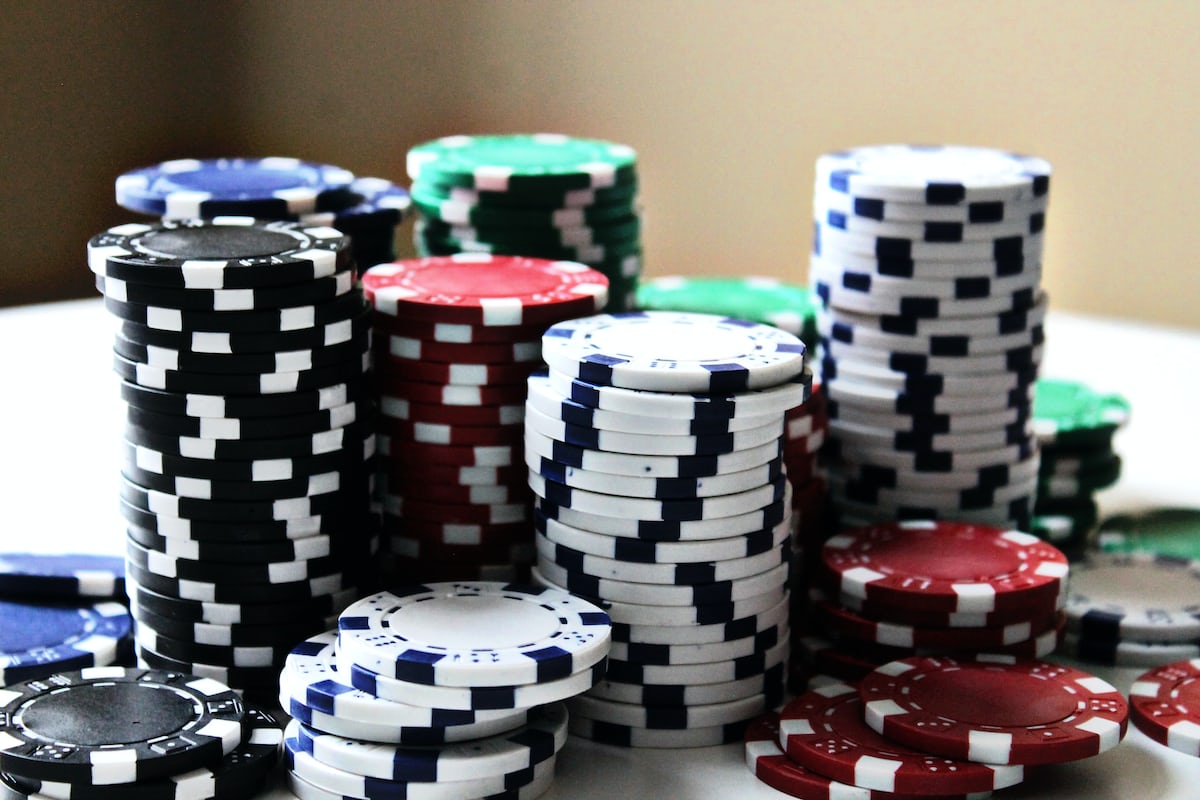Recognizing and addressing poker addiction is an important issue that needs to be addressed in the industry. Poker addiction can have serious consequences on an individual’s mental and physical health, as well as their financial stability and personal relationships. It is important for individuals, as well as the industry as a whole, to take steps to recognize and address poker addiction in order to promote responsible gaming and prevent harm.
The Warning Signs of Poker Addiction: How to Recognize Them

Poker is a popular game that has been around for centuries. It is a game of skill, strategy, and luck that can be played for fun or for money. While many people enjoy playing poker, some individuals may end up enjoying it too much, developing an addiction to the game. Poker addiction is a serious problem that can have negative consequences on a person’s life. In this article, we will discuss the warning signs of poker addiction and how to recognize them.
The first warning sign of poker addiction is when a person spends an excessive amount of time playing the game. They may neglect their responsibilities, such as work, school, or family obligations, in order to play poker. They may also lose track of time and play for hours on end without taking breaks.
Another warning sign of poker addiction is when a person becomes obsessed with winning. They may become overly competitive and feel the need to win at all costs. They may also become angry or upset when they lose, and may even try to cheat in order to win.
A person with a poker addiction may also experience financial problems. They may spend more money than they can afford on the game, and may even borrow money or take out loans in order to continue playing. They may also sell their possessions or engage in other risky behaviors in order to obtain money to play poker.
In addition to financial problems, a person with a poker addiction may also experience relationship problems. They may neglect their relationships with friends and family in order to play poker, and may even lie or deceive their loved ones about their gambling habits. They may also become isolated and withdraw from social activities in order to play poker.
Physical and emotional symptoms can also be warning signs of poker addiction. A person may experience anxiety, depression, or mood swings as a result of their gambling habits. They may also experience physical symptoms such as headaches, insomnia, or digestive problems.
If you or someone you know is exhibiting any of these warning signs, it is important to seek help. There are many resources available for individuals struggling with poker addiction, including support groups, counseling, and treatment programs.
In order to address poker addiction, it is important to first acknowledge that there is a problem. This can be difficult for some individuals, as they may feel ashamed or embarrassed about their gambling habits. However, it is important to remember that addiction is a disease, and seeking help is a sign of strength.
Once a person has acknowledged their addiction, they can begin to take steps towards recovery. This may involve setting limits on their gambling habits, seeking professional help, or finding alternative activities to replace their gambling habits.
It is important to recognize the warning signs of poker addiction and seek help if necessary. If ignored, poker addiction can ruin lives. Watch out for these warning signs, whether they apply to you or someone you know.
The Impact of Poker Addiction on Mental Health and Relationships
Poker addiction is a very real issue that can have a significant impact on players’ lives. If you don’t believe this, here are just a few things poker addiction can affect:
Mental Health
Poker addiction can have a negative impact on mental health. Individuals who are addicted to poker may experience anxiety, depression, and stress. They may become obsessed with the game and spend all of their time thinking about it. This can lead to a lack of sleep, poor eating habits, and a decline in physical health.
Poker addiction can also lead to financial problems. Individuals who are addicted to poker may spend all of their money on the game, leaving them with no money for basic necessities such as food, rent, and bills. This can lead to feelings of hopelessness and despair.
Relationships
Poker addiction can also have a negative impact on relationships. Individuals who are addicted to poker may neglect their relationships with family and friends. They may spend all of their time playing poker and not have any time for their loved ones. This can lead to feelings of loneliness and isolation.
Poker addiction can also lead to dishonesty and deceit. Individuals who are addicted to poker may lie to their loved ones about how much money they are spending on the game. They may also lie about how much time they are spending playing poker. This can lead to a breakdown in trust and communication within the relationship.
Poker addiction can have a significant impact on mental health and relationships. It is important to recognize the signs of poker addiction and seek help if needed. Never ignore this problem, whether you think you might be experiencing it or someone close to you is.
Addressing Poker Addiction: Treatment Options and Resources

Poker addiction is a serious problem that can have negative consequences on a person’s life. In this section , we will discuss how to take action against poker addiction once you’ve discovered it.
Treatment Options for Poker Addiction
There are several treatment options available for individuals who are struggling with poker addiction. The most effective treatment will depend on the individual’s specific needs and circumstances. Some treatment options include:
1. Counseling and Therapy
Counseling and therapy can be helpful for individuals who are struggling with poker addiction. A therapist can help the individual identify the underlying causes of their addiction and develop coping strategies to manage their gambling behavior. Cognitive-behavioral therapy (CBT) is a common type of therapy used to treat gambling addiction.
2. Support Groups
Support groups, such as Gamblers Anonymous, can provide individuals with a supportive community of people who are also struggling with gambling addiction. These groups can provide a safe space for individuals to share their experiences and receive support and encouragement.
3. Medication
In some cases, medication may be prescribed to help individuals manage their gambling behavior. Medications such as antidepressants and mood stabilizers may be used to treat underlying mental health conditions that contribute to gambling addiction.
Resources for Addressing Poker Addiction
There are several resources available for individuals who are struggling with poker addiction. Some resources include:
1. National Council on Problem Gambling
The National Council on Problem Gambling is a nonprofit organization that provides resources and support for individuals who are struggling with gambling addiction. They offer a helpline, online chat, and support groups.
2. Gamblers Anonymous
Gamblers Anonymous is a support group for individuals who are struggling with gambling addiction. They offer meetings both in-person and online.
3. Treatment Centers
There are several treatment centers that specialize in treating gambling addiction. These centers offer a range of services, including counseling, therapy, and support groups.
Treatment options for poker addiction include counseling and therapy, support groups, and medication. There are also several resources available for individuals who are struggling with poker addiction, including the National Council on Problem Gambling, Gamblers Anonymous, and treatment centers. With the right support and treatment, individuals can overcome their poker addiction and live a healthy, fulfilling life.
Preventing Poker Addiction: Responsible Gambling Practices
While most people who play poker do so responsibly and in moderation, there are some who develop an addiction to the game that can have serious consequences for their lives.
If you are struggling with a poker addiction, it is important to recognize the signs and take steps to address the problem. Here are some tips for preventing poker addiction and practicing responsible gambling practices:
1. Set Limits
One of the most important things you can do to prevent poker addiction is to set limits on your play. This means deciding how much time and money you are willing to spend on the game, and sticking to those limits no matter what. It can be helpful to set a budget for your poker play, and to only play with money that you can afford to lose.
2. Take Breaks
Another important way to prevent poker addiction is to take breaks from the game. This means stepping away from the table and doing something else for a while, whether it’s going for a walk, reading a book, or spending time with friends and family. Taking breaks can help you maintain a healthy balance between your poker play and other aspects of your life.
3. Seek Support
If you are struggling with a poker addiction, it is important to seek support from others. This can include talking to a trusted friend or family member, joining a support group, or seeking professional help from a therapist or counselor. It can be difficult to overcome addiction on your own, and having a support system can make all the difference.
4. Practice Self-Care
Taking care of yourself is another important way to prevent poker addiction. This means getting enough sleep, eating a healthy diet, and engaging in regular exercise and other activities that you enjoy. When you feel good physically and mentally, you are less likely to turn to poker as a way to cope with stress or other negative emotions.
5. Know When to Quit
Finally, it is important to know when to quit playing poker. This means recognizing when the game is no longer fun or enjoyable, and when it is causing negative consequences in your life. If you find yourself chasing losses, playing for longer than you intended, or neglecting other important aspects of your life because of poker, it may be time to take a break or seek help.
By practicing the habits mentioned here, you can prevent poker addiction and enjoy the game in a healthy and enjoyable way. Remember, poker is meant to be a fun and entertaining game, not a source of stress or addiction.
The Role of the Poker Industry in Addressing Addiction Among Players
The need to handle poker addiction isn’t just for players. In this article, we will discuss the role of the poker industry in addressing addiction among players.
The poker industry has a responsibility to address addiction among players. This can be done in a variety of ways, including providing resources and support for those who are struggling with addiction. For example, online poker sites can offer self-exclusion programs that allow players to voluntarily exclude themselves from playing for a certain period of time. Those would be helpful tools for those who are struggling with addiction and need a break from the game.
In addition to self-exclusion programs, the poker industry can also provide education and awareness about addiction. This can include information about the signs and symptoms of addiction, as well as resources for getting help. By raising awareness about addiction, the poker industry can help players recognize when they may be developing a problem and encourage them to seek help before it becomes too late.
Another way that the poker industry can address addiction is by promoting responsible gambling. This can include setting limits on how much money players can spend, as well as providing information about the risks associated with gambling. By promoting responsible gambling, the poker industry can help players make informed decisions about their gambling habits and reduce the risk of addiction.
Finally, the poker industry can work with addiction treatment professionals to provide support and resources for those who are struggling with addiction. This can include offering counseling services, support groups, and other resources that can help players overcome their addiction and get back on track.
In conclusion, recognizing and addressing poker addiction is crucial for the well-being of individuals who struggle with this issue. It is important to understand the signs of addiction and seek professional help if necessary. Additionally, creating a supportive environment and promoting responsible gambling practices can help prevent addiction from developing in the first place. By taking these steps, we can work towards reducing the negative impact of poker addiction on individuals and society as a whole.
